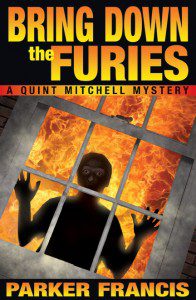Writers dream of making it big, hitting the bestseller lists, having our books made into movies. Who can blame us since living inside our head all day where we create imaginary worlds and characters can fuel extravagant fantasies. Thanks to today’s e-publishing revolution, more and more people are following their dreams. They’re taking the plunge and becoming published authors.
I did the same thing. After publishing three adventure/fantasy novels with a traditional publisher, I jumped aboard the digital bandwagon by establishing my own independent publishing company, Windrusher Hall Press. I published MATANZAS BAY, the first Quint Mitchell Mystery, in May of 2011. This year, I released a short story, BLUE CRABS AT MIDNIGHT, and recently the second Quint Mitchell Mystery, BRING DOWN THE FURIES. There will be more to follow, and, perhaps, books by other authors as well.
Since Amazon.com created the Kindle Digital Program extending 70% royalties to authors, many thousands of writers have rushed to take advantage of what they perceive to be a never-ending gravy train. We hear success stories from the likes of John Locke, Amanda Hocking and J. A. Konrath, who, in a recent blog post stated he’d made well over $200,000 on two books he released on Amazon.com in 2010.
I recall a 2006 Publisher’s Weekly report concluding that most books sell only 100 copies. Better selling titles may sell 2,000 per year. Fewer still sell 5,000 in the lifetime of the book. And only a fraction of 1% of published books ever sell a million copies.
Of course, this report preceded the surge in e-publishing and the explosion of e-reading devices. But the explosion has come with tens of thousands of new writers entering the market each year, ratcheting up the competition, making it more difficult to create buzz for our books. Which is why it’s nearly impossible for a new writer to make a living solely on their book sales. That’s probably always been the case, which is why the first advice I heard when I decided to venture into writing fiction was, “Don’t give up your day job.”
 When I retired from my day job, I decided to become a fulltime writer. I didn’t expect to strike it rich, and I had the advantage of a working wife to help if necessary. Still, the lament I often hear is how so many writers are frustrated by lagging sales, by the amount of money they poured into their business with little return on the investment. Writers who give up their day jobs, if they’re not careful, can find themselves in the same position as our federal government: living on the edge of the fiscal cliff.
When I retired from my day job, I decided to become a fulltime writer. I didn’t expect to strike it rich, and I had the advantage of a working wife to help if necessary. Still, the lament I often hear is how so many writers are frustrated by lagging sales, by the amount of money they poured into their business with little return on the investment. Writers who give up their day jobs, if they’re not careful, can find themselves in the same position as our federal government: living on the edge of the fiscal cliff.
What can be done about it? For one thing we have to face the facts that most of us won’t join James Patterson and Stephen King on the bestseller lists. There are a lot of excellent reasons to write, but maybe making money shouldn’t be at the top of the list. My number one reason for writing and publishing is to tell my own stories and share them with other people. If I broke even, I told myself, then I’d be happy. I’ve achieved that goal and more, but I still look at writing as a form of self-expression and personal fulfillment.
In his wonderful book, Telling Lies for Fun and Profit, Lawrence Block writes about the thousands, maybe millions of people content to dab paint onto canvases, and some of them very good painters indeed, with no real intention of ever selling their work. Or the people who snap photographs as a hobby. Or the craftsmen who knit and make quilts and throw pots. Do they expect to profit by their interests? Probably not.
Most do it because they enjoy the process of creating a watercolor, capturing a family image on their new digital Nikon, or sewing colorful scraps of cloth together. Unlike those acts of creativity, writing, according to Block, implies an act of communication. “If a story is not to be read, why write it down in the first place? An unpublished piece of fiction is an incompleted act, like a play staged in an empty theater.”
To complete the process of communication writers will continue to search for new ways to reach more readers. One of these is a fairly new promotional technique called the Blog Hop, a form of network marketing. I’ve been invited to participate on December 12 so check back then for an update about my new book. I’ll also take part in a blog tour in the near future, and look for other avenues to gain a marketing edge. But mostly, I’ll continue to write since that’s what is important to me.

When I first began attending writers’ conferences, I remember an established author with more than a dozen published books saying it takes at least five books before a writer can build a market for their books. BRING DOWN THE FURIES marks my fifth book, so we’ll see if this holds true. In the meantime, I’d like to hear how other writers are managing to avoid their own fiscal cliff.